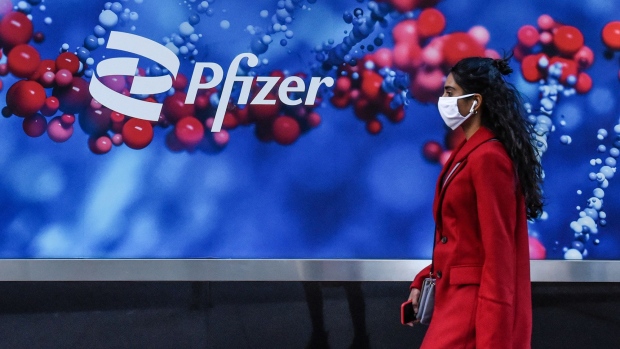Aug 25, 2022
Pfizer’s Vaccine for Lung Disease Succeeds in Big Trial of Older Adults
, Bloomberg News

(Bloomberg) -- Pfizer Inc.’s experimental vaccine for a potentially dangerous lung infection called respiratory syncytial virus hit its main goal of preventing symptoms in a large trial of 37,000 older adults.
Based on the results, the company plans to apply this fall for US approval, according to a statement, making the product a potential early entry in what could be a large, new respiratory disease vaccine market.
Pfizer anticipates it could get a priority review of the vaccine, which could shorten its path to the market, William Gruber, who heads the company’s clinical vaccine research and development, said in an interview.
The drugmaker is racing against rivals including GSK Plc, Johnson & Johnson and Moderna Inc. to test and market vaccines that target the virus, and received breakthrough therapy status for its candidate in March. The disease is dangerous to older people and those with weak immune systems, accounting for about 177,000 hospitalizations and 14,000 deaths among US elderly each year, according to one 2005 study.
British drugmaker GSK said in June that its candidate vaccine was effective in preventing RSV in a trial of roughly 25,000 adults 60 and older. GSK said then that it was the first successful final-stage trial of an RSV vaccine in older adults, and that the company would apply for clearance in the second half of the year. It did not release detailed results at the time.
Quelling Symptoms
Pfizer’s trial was intended to show whether its experimental vaccine can prevent symptoms of RSV in the lower respiratory systems of older adults that could spiral into cases needing hospitalization. Symptoms measured in the trial included cough, wheezing, increased sputum production, shortness of breath and rapid respiration, Gruber said. When patients came in with these symptoms, they were tested to confirm that RSV was the cause.
Among adults 60 and older, Pfizer’s experimental shot was 66.7% effective in preventing RSV cases with two or more respiratory symptoms in the lower respiratory tract, and 85.7% effective in preventing cases with three or more such symptoms, the company said.
No significant safety problems appeared in the trial, the company said.
The company did not release full details of the results, which it plans to present at an upcoming medical conference and submit for publication in a scientific journal. But Gruber said both results appeared to meet the FDA’s minimum efficacy criteria for RSV vaccines. The trial hasn’t continued long enough to show whether the shot actually prevents hospitalizations, he said.
Single Shot
The vaccine is a single shot containing stabilized forms of a crucial protein that the virus uses to bind to and enter human cells. Like influenza, another common lung virus, RSV is seasonal. Pfizer is continuing its adult trial to see whether a shot provides protection for more than one RSV season, Gruber said.
Pfizer said it planned to apply for approval in other countries shortly after its FDA filing.
The disease also is common in infants, and Pfizer is also conducting a trial testing the shot in pregnant women. The hope is inoculated mothers will pass antibodies along to their babies, protecting them from RSV in their first few months of life.
The New York-based drug giant also has ambitions for marketing RSV therapies, agreeing in April to pay as much as $525 million for ReViral Ltd. Annual revenue from ReViral’s experimental products to treat the lung virus could top $1.5 billion, Pfizer said then.
©2022 Bloomberg L.P.


